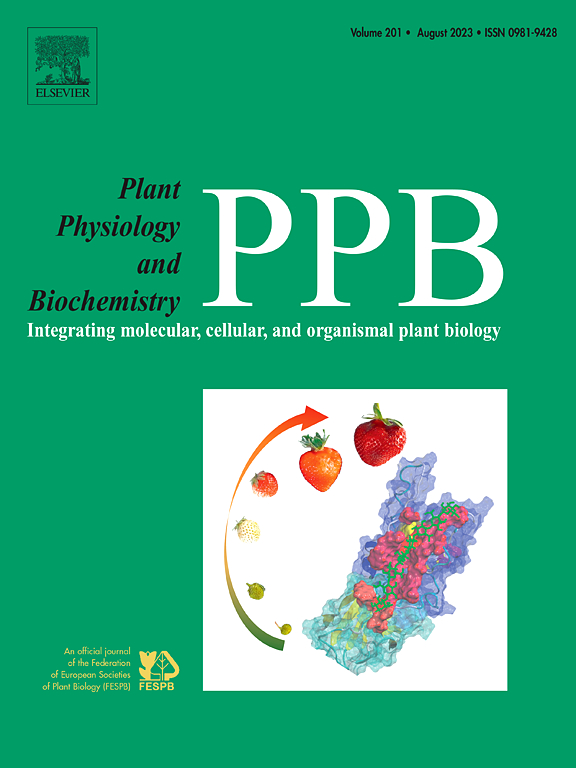褪黑素通过调节CmDREB1A/E调节脯氨酸代谢,增强哈密瓜果实的耐寒性
IF 6.1
2区 生物学
Q1 PLANT SCIENCES
引用次数: 0
摘要
研究了100 μM褪黑素(MT)处理对冷胁迫下哈密瓜果实脯氨酸积累的调控机制。结果表明,MT处理通过上调Δ1-pyrroline-5-carboxylate合成酶(P5CS)和鸟氨酸δ-氨基转移酶(OAT)基因的表达,降低脯氨酸脱氢酶(ProDH)的转录本和酶活性,提高了冷库哈密瓜果实中游离脯氨酸的含量。此外,酵母单杂交实验筛选到结合CmP5CS的CmDREB1A和CmDREB1E,电泳迁移率转移分析和双荧光素酶报告基因验证了这两个转录因子可以结合CmP5CS启动子。进一步的实验表明,CmDREB1A和CmDREB1E参与了通过MT提高哈密瓜耐寒性和调节CmP5CS的表达。我们的研究表明,MT处理通过激活哈密瓜的CmDREB1A和CmDREB1E,促进CmP5CS的表达,并正向调节脯氨酸的积累,从而提高果实的抗寒性。本文章由计算机程序翻译,如有差异,请以英文原文为准。
Melatonin regulates proline metabolism by modulating CmDREB1A/E to enhance cold tolerance in cantaloupe fruit
The potential regulatory mechanisms of 100 μM melatonin (MT) treatment on proline accumulation in cantaloupe fruit under cold stress were investigated. The results showed that MT treatment increased the content of free proline in cold-stored cantaloupe fruit by upregulating the expressions of the Δ1-pyrroline-5-carboxylate synthase (P5CS) and ornithine δ-aminotransferase (OAT) genes and decreasing the transcripts and enzyme activity of proline dehydrogenase (ProDH). Furthermore, the yeast one-hybrid assay screened for CmDREB1A and CmDREB1E that bind CmP5CS, and electrophoretic mobility shift analysis and dual luciferase reporter gene verified that these two transcription factors could bind the CmP5CS promoter. Further experiments showed that CmDREB1A and CmDREB1E were involved in improving cold tolerance in cantaloupe by MT and regulating the expression of CmP5CS. Our study suggests that MT treatment promotes CmP5CS expression and positively regulates proline accumulation by activating CmDREB1A and CmDREB1E in cantaloupe, thereby improving fruit cold stress tolerance.
求助全文
通过发布文献求助,成功后即可免费获取论文全文。
去求助
来源期刊
CiteScore
11.10
自引率
3.10%
发文量
410
审稿时长
33 days
期刊介绍:
Plant Physiology and Biochemistry publishes original theoretical, experimental and technical contributions in the various fields of plant physiology (biochemistry, physiology, structure, genetics, plant-microbe interactions, etc.) at diverse levels of integration (molecular, subcellular, cellular, organ, whole plant, environmental). Opinions expressed in the journal are the sole responsibility of the authors and publication does not imply the editors'' agreement.
Manuscripts describing molecular-genetic and/or gene expression data that are not integrated with biochemical analysis and/or actual measurements of plant physiological processes are not suitable for PPB. Also "Omics" studies (transcriptomics, proteomics, metabolomics, etc.) reporting descriptive analysis without an element of functional validation assays, will not be considered. Similarly, applied agronomic or phytochemical studies that generate no new, fundamental insights in plant physiological and/or biochemical processes are not suitable for publication in PPB.
Plant Physiology and Biochemistry publishes several types of articles: Reviews, Papers and Short Papers. Articles for Reviews are either invited by the editor or proposed by the authors for the editor''s prior agreement. Reviews should not exceed 40 typewritten pages and Short Papers no more than approximately 8 typewritten pages. The fundamental character of Plant Physiology and Biochemistry remains that of a journal for original results.

 求助内容:
求助内容: 应助结果提醒方式:
应助结果提醒方式:


